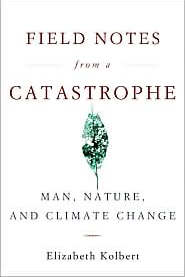

| FIELD NOTES FROM A CATASTROPHE Man, Nature, and Climate Change Elizabeth Kolbert New York: Bloomsbury, 2006 |
Rating: 5.0 High |
|||
| ISBN-13 978-1-59691-125-3 | ||||
| ISBN-10 1-59691-125-5 | 210p. | HC/GSI | $22.95 | |
Plenty of books focus on the broad impacts of climate change: Loss of polar ice, prehistoric droughts decimating civilizations, rising seas drowning vast tracts of land. Elizabeth Kolbert covers these events too. But her approach is totally different. She starts at the local level, recounting her visits to Alaska, Iceland, the Netherlands, and her interactions with the local people at those places — not only scientists but everyday people like farmers and shop owners. This is what makes her account so compelling to a wide audience.
I do not mean to imply that Ms. Kolbert ignores the big picture. She has a good grasp of it, covers the prehistory, and eloquently imparts the long-term implications of warming clearly and accurately — especially as regards the tension between the Bush administration and the rest of the world over their differing policies on climate change.
These two paragraphs come from pages 10-11 of the book:
The National Academy of Sciences undertook its first major study of global warming in 1979. At that point, climate modeling was still in its infancy, and only a few groups, one led by Syukuro Manabe at the National Oceanic and Atmospheric Administration and another by James Hansen at NASA's Goddard Institute for Space Studies, had considered in any detail the effects of adding carbon dioxide to the atmosphere. Still, the results of their work were alarming enough that President Jimmy Carter called on the academy to investigate. A nine-member panel was appointed. It was led by the distinguished meteorologist Jule Charney, of MIT, who, in the 1940s, had been the first meteorologist to demonstrate that numeric weather forecasting was feasible. The Ad Hoc Study Group on Carbon Dioxide and Climate, or the Charney panel, as it became known, met for five days at the National Academy of Sciences' summer study center in Woods Hole, Massachusetts. Its conclusions were unequivocal. Panel members had looked for flaws in the modelers' work but had been unable to find any. "If carbon dioxide continues to increase, the study group finds no reason to doubt that climate changes will result, and no reason to believe that these changes will be negligible," the scientists wrote. [...] The effect of adding CO2 to the atmosphere is to throw the earth out of "energy balance." In order for balance to be restored—as, according to the laws of physics, it must be—the entire planet has to heat up, a process, the Charney Panel noted, that could take "several decades." Thus, what might seem like the most conservative approach—waiting for evidence of warming to make sure the models were accurate—actually amounted to the riskiest possible strategy: "We may not be given a warning until the CO2 loading is such that an appreciable climate change is inevitable. – Pages 10-11 |
I quote them to show how much time has been wasted.
"Without substantive commitments from countries like India and China, there is no realistic way to avoid DAI [dangerous anthropogenic interference]. But why should China and India accept the costs of controlling emissions when America has refused to do so? In this way, the United States, having failed to defeat Kyoto, may be in the process of doing something even more damaging: ruining the chances of reaching a post-Kyoto agreement. – Page 174 |
The book has some defects. Ms. Kolbert doesn't understand computers well, and her description of climate modeling in Chapter 5 leaves something to be desired. She doesn't do justice to the concept of grid cells, and then quotes a snatch of FORTRAN code (from the GISS "ModelE") to little effect. Her analogies are sometimes obscure: Attempting to explain the immense amounts of energy needed to warm the oceans and icecaps, she writes on page 105: "(Imagine trying to thaw a gallon of ice cream or a pot of water using an Easy-Bake oven.)" I would, if I knew what an Easy-Bake oven was.1 Similarly, she omits some definitions and fails to expand some acronyms, trusting the reader to know what they represent. But such mistakes are few, and my mention of them is a mere quibble.
The bottom line is that this is one of the must-read books on climate change. Ms. Kolbert brings home the projected impacts as few other authors manage to do. For me, the highlights were her tours of Iceland and the Netherlands, with descriptions of the Maesland Barrier and the floating homes at Maasbommel in the latter country. Also, as noted above, one of the most meritorious aspects of the book is her coverage of the political angle, especially the improvident behavior of the Bush administration in response to Kyoto and to global warming generally.2 The book provides a chronology of significant events related to climate change, selected bibliography and notes for each of its 10 chapters, and it has a very good index. Finally, it is an easy read; I expect it would take half a day, typically. (It took me thrice that, but other demands competed.)

 To contact Chris Winter, send email to this address.
To contact Chris Winter, send email to this address.